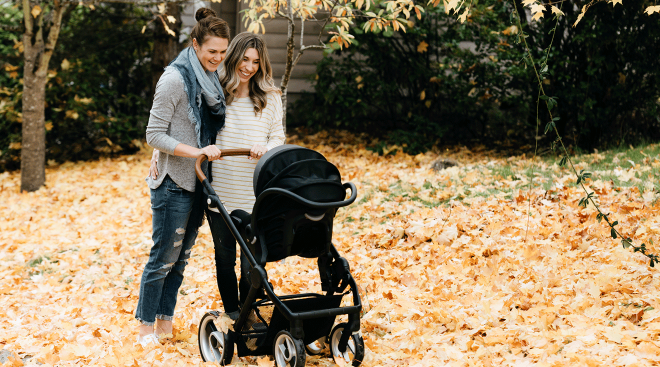- Did you feel that little flutter? Baby is moving and grooving and doing flips—and you most likely feel their tiny kicks and punches. This early movement is called quickening—and it’s so exciting!
- Your anatomy scan might be taking place this week! Your ultrasound tech and doctor will take lots of measurements and make sure everything is developing appropriately. You can also find out the sex, if you haven’t already!
- You’ve probably gained about 14 pounds—give or take—at this stage of the game. Remember, to focus less on the number and more on eating a well-rounded diet and getting movement.
- Braxton Hicks—or practice contractions—might start any day now. At this point, it’ll feel like a quick tightening. It should stop once you change positions.
If you haven’t picked that perfect name yet, check out The Bump’s extensive lists of baby names of all sorts; cool names, beautiful names, hipster names and much more. At 21 weeks pregnant, you’re not just choosing a name, you’re hard at work getting your home ready too. Of course, choosing gear can be hard, but try not to stress about it at week 21 of pregnancy. Trust us, baby won’t care if you pick out a Pack ‘n Play that clashes with the area rug!
Wondering what’s going on with your 21-week fetus? As baby's digestive system preps for the outside world, they’re manufacturing meconium, the tarry black substance you'll find in the first dirty diaper. Here are some other exciting developments!
- Bone marrow is now developed and starts pumping out red blood cells—which was, until now, the job of baby’s liver and spleen. Hemoglobin (a type of protein) in baby’s red blood cells delivers oxygen, via the placenta, to baby’s whole body. When baby’s cells use oxygen, they create carbon dioxide waste, which red blood cells then transport back to the placenta to be discarded. Continue to support your body and baby’s red blood cell supply by taking your prenatal vitamins and eating iron-rich foods, such as dark leafy greens, lentils, beans, peas, fish, nuts and red meat.
- What’s the fuzz? By 21 weeks of pregnancy, your baby’s whole body is covered in a light coat of peach fuzz hair, known as lanugo. It began developing sometime in the last month or so and likely serves the same purpose as a fur coat, keeping baby’s body temperature warm and stable. Incredibly, it also helps fuel baby’s growth, by sending vibrations when they move. Lanugo falls off—and baby’s growth slows—by about week 37 of pregnancy. That means baby might have a bit more body hair (which will eventually fall out) if they’re born a few weeks early.
- Baby’s sense of hearing has developed enough that they can hear all the action going on inside your body—including the whoosh of your heartbeat, churning of your digestive system and, thrillingly, your voice. Newborns often recognize their parents’ voices and the songs and stories you repeat frequently, fresh out of the womb. So go ahead and start talking, singing and reading to your little one now. Some research has shown that fetuses already respond to noises outside of the womb at this age, reacting when a speaker plays certain sounds on the belly. But baby won’t really start hearing what’s going on outside of the womb until the third trimester, around the 27th or 28th week.
- Bet you hadn’t even thought about future grandchildren yet, but the reproductive system is developing too. If it's a girl, she's already got a lifetime supply of eggs in her womb—about six million of them! Having a boy? His testes are still located in his abdomen but will drop in the coming weeks once the scrotum finishes developing.
How big is baby at 21 weeks?
At 21 weeks pregnant, baby is as big as a head of endive. At 8.5 inches and about 12 ounces, baby is big enough now that you've probably been feeling their fetal movements more and more lately. Keep in mind that at 21 weeks, baby size is now measured in full body length, rather than crown to rump, so you can get a real idea of how big your baby is at 21 weeks pregnant!
What is baby doing at 21 weeks in the womb?
Now, at 21 weeks, fetal movement is noticeable—and baby has reflexes too! If you gently press your palm on your belly, you might feel a little push back. So cool! Baby at 21 weeks is practicing coordinated movements and enjoying the room they currently have in your uterus, which means they also need 12 to 14 hours of sleep every day. Baby at 21 weeks is also practicing swallowing amniotic fluid (don’t worry, it’s just practice—baby still gets everything they need through the placenta) and growing taste buds as well as head and body hair.
21 weeks pregnant is how many months?
Twenty-one weeks pregnant is five months pregnant, although doctors track pregnancy by week, not month. Since pregnancy is 40 weeks long, you’re now a majority of the way through your pregnancy!
21 week ultrasound
You’ll get a glimpse of that cute little 21-week fetus if you have your mid-pregnancy ultrasound this week. This 21 weeks ultrasound will amaze you! Not only will you get to see baby on the screen, you’ll also get to see some awesome details like the brain hemispheres and chambers of the heart. Let your technician know whether or not you want to know baby’s sex.
Finding out whether it’s a boy or a girl is a pretty exciting moment! But you can also save it for later if you want. Some parents-to-be wait until baby is born to know the sex. Or you could ask the technician to write it down and put it in an envelope so you can take it home. Then, you could plan a gender reveal party, where you can find out the surprise while surrounded by your family and friends. Fun!
At 21 weeks pregnant, pictures of baby are bound to be adorable! Ask for lots of printouts of the pictures, because if you have an uncomplicated pregnancy, this may be the last medical ultrasound you’ll get during pregnancy. Now go show off those photos of your cutie! And keep brainstorming those names!
Common 21 weeks pregnant symptoms are kind of like a sneak preview of the third trimester. Here’s what you might be feeling at week 21 of pregnancy:
Heartburn and/or indigestion
Avoid spicy and greasy foods and other triggers to control your heartburn and indigestion. If the source of your discomfort is a mystery, keeping a food diary could help you figure it out.
Braxton Hicks contractions
Your uterus might occasionally feel tight as it practices for labor. Braxton Hicks at 21 weeks are totally normal as long as the contractions go away when you switch positions. Let your doctor know about any pain or contractions that don’t stop.
Leaky boobs
Your milk ducts will be fully developed by the end of this trimester—just in case of an early arrival—so you may experience some leaking from your breasts.
Dry, itchy skin
Your skin is stretching over your growing bump, making it drier and more irritated by the day. Lather up with a pregnancy-safe body oil or lotion to help your skin stay moisturized and hopefully less itchy. Also, if you develop a rash, let your doctor know right away, since that could be a sign of an annoying pregnancy condition called PUPPP.
Stretch marks
Your skin gets pulled thinner as baby grows, causing tiny tears beneath the surface of your skin. Stretch marks are more common for some women simply because of family history or because of sudden weight gain. They are also more common in women who are 21 weeks pregnant with twins. There’s no way to truly get rid of stretch marks, but they should fade significantly after birth.
When should I worry about Braxton Hicks at 21 weeks?
You shouldn’t worry at all unless the contractions don’t stop after a couple minutes, get stronger and closer together or there’s fluid or bleeding from the vagina. In those cases, call your doctor. Otherwise, Braxton Hicks contractions are prepping your uterus for all that hard work contracting during labor. Braxton Hicks at 21 weeks are normal but usually just periodic. They rarely last more than two minutes and are often brought on by sex and orgasm, a full bladder, dehydration or a big kick from baby.
This week, you may look in the mirror at your 21 week baby bump and wonder, “Where did I go?!” By the time you reach 21 weeks pregnant, you may have gained around 13 to 14 pounds, and around 21 pounds if you’re 21 weeks pregnant with twins.
Your newfound curves might have you feeling super sexy and confident—after all, you’re the center of attention wherever you go! But the extra weight also might have you feeling self-conscious. Remind yourself, you’re supposed to be gaining this weight and do your best to embrace those curves. If you still find yourself over-focusing on weight, be sure to let your provider know.
In fact, all the weight you gain during pregnancy isn’t just padding for baby—it all serves a really important purpose. Here’s a logical way to think of it: Of the approximately 30 pounds you’ll gain throughout your pregnancy, there’s a whole lot more than fat. Here’s what makes up that weight:
- An average full-term baby = 7.5 pounds
- Placenta = 1.5 pounds
- Uterus = 2 pounds
- Amniotic fluid = 2 pounds
- Maternal stores of fat, protein, and other nutrients (needed for breastfeeding!) = 7 pounds
- Breast tissue (also for breastfeeding, of course) = 2 pounds
- Increased fluid volume = 2 to 3 pounds
- Increased blood volume = 4 pounds
See? All those pounds are doing a lot of good, keeping baby alive and healthy—and storing up good stuff to nourish them after birth. Anytime you’re feeling a little meh about your body, think of all the amazing things it’s doing!
What to expect at 21 weeks pregnant with twins
If you’re 21 weeks pregnant with twins, your belly is getting tight, itchy and dry, and you may have already developed some stretch marks. Keep rubbing that 21 week baby bump with plenty of lotion to ease the itchiness. Heartburn is probably a close personal friend at this point too, so watch what you eat to make sure you don’t make it worse, and keep meals smaller and more frequent. If that doesn’t do it, talk to your doctor about a pregnancy-friendly antacid.
Remember that each pregnancy is different. Don't compare yourself to other pregnant women or try to compare your experience with previous pregnancies. Just relax and enjoy this special time!
You’re moving and grooving through this pregnancy. The next 19 weeks or so are going to fly—or crawl (depending). In the meantime, here’s what you should do right now.
Drink your water
Water can help with 21 weeks pregnant symptoms. As counterintuitive as it may seem, staying hydrated keeps your body from retaining water; it also helps calm those Braxton Hicks contractions and is a good way to help fend off UTIs.
Keep moving
Exercise may sound like a chore right now, but it’ll help with swelling and circulation. Try prenatal yoga, an easy walk or swimming if that belly is feeling extra heavy these days.
Sign up for classes
If you’re interested in taking childbirth classes, breastfeeding classes or infant care classes, now is the time to sign up if you haven’t yet. Classes often fill up early, so get them on the books before your final month.
Frequently Asked Questions
Will I have another ultrasound after the anatomy scan?
Not necessarily, but it’s possible. The anatomy scan usually takes place around week 20 of pregnancy and checks baby’s growth and due date, among other things. That said, your ultrasound schedule is up to your practitioner. You may need more ultrasound screenings later in pregnancy (including a biophysical profile for a number of reasons, including if you have a high-risk pregnancy or to check your baby’s position.
Are stomach aches normal during pregnancy?
Stomach pain during the second trimester of pregnancy is common and often caused by round ligament pain—when the ligaments supporting your belly stretch to accommodate your rapidly-growing bump. Try taking a warm bath or lying on your opposite side to relieve the discomfort. You’re also more likely to be gassy and constipated during pregnancy, thanks in part to your slowed-down digestion. Drink plenty of water and eat more fiber to stay regular. Be sure to check in with your doctor if stomach pain is accompanied by unusual vaginal discharge, especially spotting or bleeding, as well as pain when you urinate, regular cramping or lower back pain.
Can pregnancy increase your sex drive?
Feeling frisky? It might seem counterintuitive, but many pregnant people (and even their partners) notice a ramped-up libido during pregnancy, especially around the mid-way point. For one, you can thank hormonal changes and increased blood flow (which, by the way, may make it easier to orgasm). Plus, the second trimester is often the most enjoyable part of pregnancy: You’ve likely said goodbye to first trimester pregnancy symptoms, like nausea, but aren’t yet feeling the discomfort of a third-trimester bump. Unless your healthcare practitioner has told you otherwise (because you have specific risk factors, such as bleeding), it’s safe to have sex and even orgasm throughout pregnancy.
When can your baby feel touch?
Baby’s sense of touch is critical to their first interactions with the outside world, and it begins developing early on. As early as 8 weeks of pregnancy, babies have sensation on their lips and nose. From there on out, baby’s sense of touch expands to other body parts as they learn to swallow, kick, punch and otherwise explore their tiny world. For most of pregnancy, this is a purely joyful experience: Research suggests that the nervous system isn’t developed enough for babies to experience pain until at least week 24 or 25 of pregnancy.
What upcoming tests or screenings should be on my radar?
By 20 weeks of pregnancy, barring any complications, you’ve likely already had most recommended tests and screenings, including ultrasounds and genetic tests. As always, your practitioner will likely have you provide a urine sample at every visit. Between weeks 24 to 28, you can expect a glucose screening, where you’ll drink a very sugary beverage and your blood will be drawn to check for signs of gestational diabetes. Otherwise, depending on your pregnancy and specific risk factors, your practitioner may or may not schedule additional screenings between now and the end of your pregnancy, including ultrasounds and blood tests.
They call it the honeymoon stage of pregnancy. But it's more like the start-feeling-human-again stage of pregnancy. It was such a relief to not feel awful after 15+ weeks.
Please note: The Bump and the materials and information it contains are not intended to, and do not constitute, medical or other health advice or diagnosis and should not be used as such. You should always consult with a qualified physician or health professional about your specific circumstances.
Cleveland Clinic, Quickening in Pregnancy, April 2022
Cleveland Clinic, 20-Week Ultrasound (Anatomy Scan), April 2022
American College of Obstetricians and Gynecologists, How Much Weight Should I Gain During Pregnancy?, August 2021
National Library of Medicine, Braxton Hicks Contractions, August 2023
Archives of Disease in Childhood, Meconium Analysis to Detect Fetal Exposure to Neurotoxicants, August 2006
Cleveland Clinic, Meconium, September 2022
National Library of Medicine, Embryology, Ovarian Follicle Development, August 2023
National Library of Medicine, Embryology, Testicle, April 2023
American Pregnancy Association, 21 Weeks Pregnant
Cleveland Clinic, Fetal Biometry, June 2023
Kaiser Permanente, Your Developing Baby - Week 21, July 2022
Psychological Science, Flavor Sensing in Utero and Emerging Discriminative Behaviors in the Human Fetus, September 2022
Mayo Clinic, Pregnancy Week by Week: Fetal Development: The Second Trimester, June 2022
American College of Obstetricians and Gynecologists, How Long Does Pregnancy Last?, October 2020
Cleveland Clinic, Ultrasound in Pregnancy, September 2022
American Pregnancy Association, Heartburn During Pregnancy
Cleveland Clinic, Colostrum, February 2022
Cleveland Clinic, Lactation, December 2021
American Pregnancy Association, Skin Changes During Pregnancy
American Pregnancy Association, Pregnancy Stretch Marks
Mayo Clinic, Stretch Marks, January 2023
Journal of the American Academy of Dermatology, Incidence and Risk Factors for Striae Gravidarum, 2015
American Academy of Dermatology, Stretch Marks: Why They Appear and How to Get Rid of Them
University of Pennsylvania Health System, What are Braxton Hicks Contractions?
American College of Obstetricians and Gynecologists, Weight Gain During Pregnancy, 2023
Archives of Women’s Health, Body Dissatisfaction and Disordered Eating in the Perinatal Period: An Underrecognized High-Risk Timeframe and the Opportunity to Intervene, May 2022
University of Rochester Medical Center, Newborn Measurements
Mayo Clinic, Pregnancy Week-by-Week: Pregnancy Weight Gain: What’s Healthy?, February 2022
Nemours KidsHealth, How Can I Deal With Heartburn During Pregnancy?, August 2019
American College of Obstetricians and Gynecologists, How Much Water Should I Drink During Pregnancy?, October 2020
Nemours KidsHealth, Can Pregnant Women Do Anything to Reduce or Prevent Swollen Ankles?, January 2021
American Pregnancy Association, Natural Treatments for UTIs During Pregnancy
American Pregnancy Association, Exercise During Pregnancy
OASH Office on Women’s Health, Birthing, Breastfeeding, and Parenting Classes, February 2021
American College of Obstetricians and Gynecologists (ACOG), [Ultrasound Exams](https://www.acog.org/womens-health/faqs/ultrasound-exams )
Cleveland Clinic, Ultrasound in Pregnancy
NHS, Stomach pain in pregnancy
Cleveland Clinic, Pregnancy Pains
NHS, Sex in Pregnancy
UT Southwestern Medical Center, Womb with a view: Sensory development in utero
American College of Obstetricians and Gynecologists (ACOG), Facts Are Important: Gestational Development and Capacity for Pain Nemours Kids’ Health, Prenatal Tests: Second Trimester
NCT, Pregnancy Week 21
NHS, Week 21
HealthyChildren.org, American Academy of Pediatrics (AAP), When can my unborn baby hear me? I'd love to be able to read and sing to them
Archives of Disease in Childhood. Fetal and Neonatal, Development of fetal hearing, Sept. 1994
Learn how we ensure the accuracy of our content through our editorial and medical review process.
Navigate forward to interact with the calendar and select a date. Press the question mark key to get the keyboard shortcuts for changing dates.















































